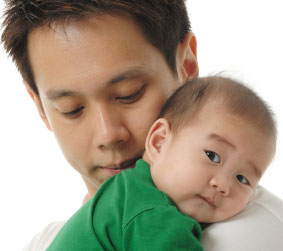You and your partner couldn’t be more excited for the arrival of your new baby. You’ve created a dream nursery, read every baby book and parenting magazine under the sun, and even taken Lamaze classes together. What’s more, feeling that first kick has made you realize you’ll soon be gazing into the face of this precious little person who you’ve been dying to meet.
_x000D_And while your husband is surely also anticipating the Big Day, he may also have his own concerns. First-time fatherhood, while exhilarating, can be “quite jarring,” says Renee Sullivan, a parenting coach for babybites.com. “Women have the benefit of slowly adjusting during their pregnancy: their body changes, their food preferences alter, everything is gradual and cumulative. While they get to wade their toes and gently test the warm waters of parenthood, new dads are cold-plunged into the pool after birth.”
_x000D_But before adopting a ‘sink or swim’ approach to parenting, experts advise that a little forethought and lots of communication with your partner can go a long way.
_x000D_From Me to We
_x000D_One of the biggest challenges an expectant dad is likely to face is a constant struggle between his old and new life. “So many people are tempted to keep things the way they are,” says Matthew Miller, father and author of Maybe Baby: An Infertile Love Story. “While you don’t have to give up everything, you do have to admit to yourself that things will change.”
_x000D_To counteract these worries, talk to your partner in advance. “I encourage people to make a priority list beforehand and discuss it with your partner to see what you are willing to give up—and what you’re not,” says Miller. “This way, you are both on the same page.”
_x000D_Delivery Room, Diapers and Everything in Between
_x000D_A definite nerve-wracking part of the new parenting process takes place in the delivery room—something no one can completely prepare for. “It doesn’t hurt to watch a birthing video, though,” recommends Miller, recalling a man who nearly passed out in the Lamaze class he was taking with his wife. “You really need to know visually what to expect.”
_x000D_Alternatively, speak to your partner ahead of time about the role you’ll play: whether you’ll be holding her hand or watching your child enter the world. Regardless of where you’ll be standing, being supportive and calm is a must. “Listening is crucial,” adds Sullivan. “Be responsive to any of her needs in the labor room.”
_x000D_Once everyone is back at home and settling in to their new routine, there’s no time like the present to pitch in and help out. “Be the ‘inventory manager’ and make sure that the household doesn’t run out of diapers, formula, food or toilet paper,” says Sullivan.
_x000D_Also, consider taking a more active part in parenting. “Start changing diapers and help with the first bath,” says Miller. “The more confident you are, the better dad you’ll start to be because you can take control of the situation.”
_x000D_He also suggests giving Mom a break and enjoying some one-on-one time with your new baby. “One thing dads miss out on is skin-to-skin contact,” Miller observes. After a feeding or burp, let your baby lay on you for a while and take a moment together. “Bonding does happen,” he adds.
_x000D_De-Bunking the Myths
_x000D_During the first few months of parenthood, many new dads find themselves being bombarded with tons of unsolicited advice. Among one of greatest myths Miller has heard is, “‘You’ll understand when you’re a dad.’ Not all babies are the same and the advice you may receive might not even pertain to your baby.”
_x000D_Instead, offers Miller, trust your gut when it comes to figuring out your baby’s needs. “Parents become experts on their own child as they grow,” he says. “You are going to be the one to best handle your own baby.”
_x000D_Sullivan too knows about dispensing false truths when it comes to parenting, especially the one about how “it gets easier. It doesn’t—you just get smarter,” she says. “As you adjust, you get wiser, more proactive and more accepting. After time, the new patterns and routines begin to set in and you begin to relate to your new role as dad.”




